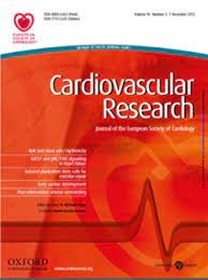Local arterial administration of acidified malonate as an adjunct therapy to mechanical thrombectomy in ischaemic stroke
IF 13.3
1区 医学
Q1 CARDIAC & CARDIOVASCULAR SYSTEMS
引用次数: 0
Abstract
Aims Ischaemic stroke is increasingly treated by mechanical thrombectomy (MT) with the more rapid and complete reperfusion of the ischaemic tissue enhancing patient outcome, compared to recombinant tissue plasminogen activator (rtPA) alone. Even so, there is still extensive brain infarction and disability following MT, that is exacerbated by ischaemia-reperfusion injury (IRI) and other pathological processes during reperfusion. Hence, an adjunct therapy to MT that decreases IRI should enhance patient outcomes. Methods and Results To test this possibility, we adapted the transient middle cerebral artery occlusion (tMCAO) mouse model to allow local intra-arterial administration of acidified disodium malonate (aDSM) to decrease IRI as the ischaemic tissue was reperfused. Administration of aDSM (160 mg/kg; pH 6) during reperfusion decreased brain infarct volume by ∼60 % when assessed by magnetic resonance imaging (MRI) 24 h after reperfusion and improved neurological function. Conclusion These findings suggest aDSM as a potential adjunct therapy to further improve outcomes for stroke patients treated by MT.局部动脉给药酸化丙二酸盐作为缺血性脑卒中机械取栓的辅助治疗
与单独使用重组组织型纤溶酶原激活剂(rtPA)相比,机械取栓(MT)治疗缺血性脑卒中越来越多,其缺血组织的再灌注更快、更完全,从而提高了患者的预后。尽管如此,MT术后仍存在广泛的脑梗死和残障,再灌注过程中缺血再灌注损伤(IRI)等病理过程加重了脑梗死和残障。因此,MT的辅助治疗可以减少IRI,从而提高患者的预后。方法和结果为了验证这种可能性,我们采用了短暂性大脑中动脉闭塞(tMCAO)小鼠模型,允许在缺血组织再灌注时局部动脉内给予酸化丙二酸二钠(aDSM)以减少IRI。给药aDSM (160 mg/kg;再灌注时pH值为6),再灌注后24小时磁共振成像(MRI)评估,脑梗死体积减少约60%,神经功能得到改善。结论aDSM是一种潜在的辅助疗法,可进一步改善脑卒中MT治疗患者的预后。
本文章由计算机程序翻译,如有差异,请以英文原文为准。
求助全文
约1分钟内获得全文
求助全文
来源期刊

Cardiovascular Research
医学-心血管系统
CiteScore
21.50
自引率
3.70%
发文量
547
审稿时长
1 months
期刊介绍:
Cardiovascular Research
Journal Overview:
International journal of the European Society of Cardiology
Focuses on basic and translational research in cardiology and cardiovascular biology
Aims to enhance insight into cardiovascular disease mechanisms and innovation prospects
Submission Criteria:
Welcomes papers covering molecular, sub-cellular, cellular, organ, and organism levels
Accepts clinical proof-of-concept and translational studies
Manuscripts expected to provide significant contribution to cardiovascular biology and diseases
 求助内容:
求助内容: 应助结果提醒方式:
应助结果提醒方式:


